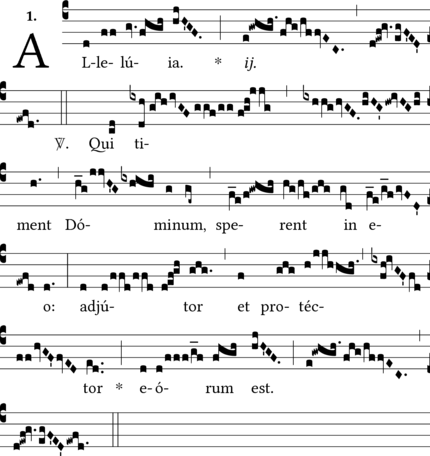A translation of a commentary on the Alleluia Qui Timent Dominum written by a monk of Triors on 13 October 2018, published on L’homme nouveau.

Alleluia. They that fear the Lord have hoped in the Lord: he is their helper and their protector. (Psalm 113, 19).
Spiritual Commentary
 Here we have an original text that is neither a prayer of praise nor a prayer of petition. It is not the soul speaking to the Lord nor the Church addressing her Spouse, but rather a word of comfort that descends from on high. For once, one might say, it is God who speaks to men, passing through the psalmist, that experienced sage who encourages the people, inviting them to place their trust on the mighty deeds of the Lord throughout history. Psalm 113 (or 114 and 115 in the Hebrew tradition) is renowned (In exitu Israel) for its celebration of the mystery of the old Passover and especially the crossing of the Red Sea. In the second section, the psalm emphasizes the vanity of idols and the security, on the other hand, of trust in God. Three verses, from which this Alleluia takes the third, are addressed respectively to the people of God in toto, to the priests, and to those that fear the Lord, inviting them to place their entire faith and entire trust in God. The refrain of these three verses, which was surely taken up by the assembly, explains the reason behind this trust:
Here we have an original text that is neither a prayer of praise nor a prayer of petition. It is not the soul speaking to the Lord nor the Church addressing her Spouse, but rather a word of comfort that descends from on high. For once, one might say, it is God who speaks to men, passing through the psalmist, that experienced sage who encourages the people, inviting them to place their trust on the mighty deeds of the Lord throughout history. Psalm 113 (or 114 and 115 in the Hebrew tradition) is renowned (In exitu Israel) for its celebration of the mystery of the old Passover and especially the crossing of the Red Sea. In the second section, the psalm emphasizes the vanity of idols and the security, on the other hand, of trust in God. Three verses, from which this Alleluia takes the third, are addressed respectively to the people of God in toto, to the priests, and to those that fear the Lord, inviting them to place their entire faith and entire trust in God. The refrain of these three verses, which was surely taken up by the assembly, explains the reason behind this trust:
The house of Israel hath hoped in the Lord: he is their helper and their protector.
The house of Aaron hath hoped in the Lord: he is their helper and their protector.
They that fear the Lord have hoped in the Lord: he is their helper and their protector.
By choosing this last verse, the composer of this Alleluia seems to have meant to give the chant a universal scope. Those who fear the Lord does not refer only to Christians, but to all believers and even all men of good will. This is, therefore, a song of evangelization. We said above that it is God who speaks. It is also Christ who addresses his faithful servants as those who seek the truth. It is also the Church who encourages her children and does not hesitate to invite all of humanity to turn towards the only Saviour. This word that descends from on high does good for souls, but it is not only a word of comfort, but also a promise. The benefit of trust in God is not only feeling supported and protected by the tenderness and power of his heart and his arm; the true benefit it precisely to enter into an intimate relationship with God. And this intimacy is both a promise and a reality. I should say that the main benefit of trust is expressed more in the first part of the verse than in the second. Those that fear the Lord: that is the great benefit. To enjoy his succour and his strength is the result and recompense of love, but the fear of God is the cause of this trust and of everything that follows.
This leads us to say a word about fear: what does it mean to fear God? It is to dread him, yes, because God is dread-inspiring. He is the Infinite Being, All-Powerful, Transcendent, and we are nothing in his presence. But the Biblical notion of fear of God far surpasses this basic natural terror in the face of an invincible force. For the people of God, and especially its highest representatives, have experienced a force that is only exercised in the name of a love, a love that, more than any other quality, represents the very being of God. God is Love. Already in the Old Testament, the just had this intuition and experienced it. The fear of God, as it is sung in this Alleluia, and as it is desired by all men of good will, is reverence for his majesty, respect for his laws—especially those inscribed in nature—and finally the love of the creature who responds to the Love of the Creator, the love that is disseminated amongst men, the fear of hurting him who loves us so much and who has shown this in so many ways. This fear of God is the fear of children of the same Father. To live in this love is already hope; to already have the assurance of succour and protection from a love that shall never fail. Ultimately, this chant is suffused with the theological virtues: fear corresponds to charity, this charity begets hope, and hope is based on an act of faith. God is our help and our shield. Let us make this injunction ours, an injunction that is not strictly-speaking a prayer, but a true blessing as well as an infinite promise.
Musical Commentary

The first mode with its serene formulas seems perfectly suited to adorn this text. The melody of this Alleluia—which served as a model for the Alleluia Cantate Domino (of the 16th Sunday after Pentecost)—is very calm, full of trust, without any trouble or anxiety. The Church transmits this message full of sweetness and tenderness, doing so as a true Mother and also as a teacher, giving an example of total abandonment to divine protection.
After a sober and peaceful jubilus, the versicle is composed of two melodic phrases.
We admire the beautiful structure of the intonation, which is at once strong, slight, and serene. A starting note on Re, holding out on the double Fa, another hold on Sol, then a sober and fluid run up first to La then to Do in a well-developed and broad movement, before a smooth and gentle descent to the cadence in Fa. All of this forms a beautiful curve that is well-crafted, light and nuanced. The remainder of the jubilus is nicely contained in the Re-La fifth interval characteristic of the first mode with only one exception, the rest on the low Do in the second bar. Thus, despite the bright summit of the intonation, the jubilus is very modest, and one might say that the entirety of the piece unfolds in this quiet atmosphere.
The first word of the versicle (timent) is very developed on the melodic level. It begins with a typical first-mode formula that is often used for the intonation of introits. This melisma is very beautiful, very light, very legato, full of momentum and suppleness, barely holding the long notes that nonetheless make an fitting rhythm, sometimes on Sol, other times on Do, or La, or even Fa. It seems that it does not want to finish, and the unresolved final on La expresses the movement that carries it beyond itself to the object of its praise and reverential fear: the Lord, Dominum. On this word there is a little more movement, but without exaggeration. Most of all, it is suffused tenderness and profound veneration, showing that this fear is precisely a fear of love. After this very modest peak, the melody confines itself without exception to the Re-La fifth interval until the end of the first phrase. It is always very light and, above all, peaceful, without interruptions. By this balance, it marvelously attires the expression of hope. Second intervals are dominant, since of the 26 intervals in this phrase, 17 are seconds, against 5 thirds and a single fourth, and three unisons.
The second phrase begins piano, on adjutor, full of recollection, with a melodic repetition and a gentle insistence on Fa that makes God’s succour come to life. The rise that follows by degrees, before coming to rest on the final syllable, remains sober, but one feels that trust continues to suffuse the soul. This confidence grows ardent on protector, but it never really gushes forth; rather, it is sung in a sentiment of profound peace and interior gratitude, as the soul feels itself enveloped in the powerful yet gentle divine protection. Protector is often translated as “shield”, which evokes battle. The contrast between the melody and text is then all the greater and more significant: there is truly nothing to fear if one fears God and is defended by the strength of his love. In the second part of the melisma on protector, the melody inevitably returns to the lower range, with its soothing final cadence on Re.
Beginning with eorum est, the light and tranquil atmosphere of the jubilus of this beautiful, interior Alleluia returns. Once again, we are obliged to note that Alleluias do not always merely express external joys. This one is a contemplative chant, without excesses. It gives the soul that sings it the certainty of being loved, heard, and protected by the strongest of loves.
